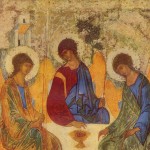I spent my lunch hour (and then some) sitting around a table with the senior pastor of a Presbyterian church, the priest of a local Orthodox congregation, and three other laymen (for lack of a better word). We were brought together by several strokes of remarkably good fortune, the intricacies of which would take much too long to explain here. The long and short of it, though, is that we got together to talk about a movie.
Not just any movie, mind you, but one of the best, Andrei Tarkovsky’s Andrei Rublev — that poetic, mystical, transcendant biopic of the 15th century Russian icon painter. Rublev was the first Tarkovsky film that I saw, and I’m still feeling the consequences. That I’m even posting to Long Pauses can be attributed directly to that viewing and to the awakening that it inspired in me.
Last fall I spent nearly three months preparing and leading discussions of the arts with a group of friends from my church. The experience was at times frustrating, at times beautiful. What I soon realized was how muddied the discourse of faith/religion and art/creativity is. I’m not sure what exactly I mean by “muddied,” except that it seems to get at some of the dogmatic biases that hinder productive communication between peoples of differing theological bents. I honestly believe that art — or any medium, really, through which God reveals His presence in immediate, often non-verbal ways — can serve the reconciliation of His church. But until I led those discussions, I never knew how tricky a proposition it could be.
What I found most gratifying about today’s meeting was the generosity of all involved, the obvious sense that we were gathering for a communal and (I use this word with some hesitation) sacred experience. Perhaps that is ultimately testament to Tarkovsky’s genius. He strove throughout his career to capture on film images that would force viewers to experience complex and contradictory emotions and, in the process, to be rendered capable of spiritual improvement. As we spoke — and we certainly spoke more about God than about the film — I was reminded often of how well he had succeeded. Instead of debating the particulars of plot developments or performances or special effects, as is often the case when Americans gather to talk movies, we struggled to make sense of the lingering emotions and longings that Rublev had wrestled from us. A friend calls this “creational theology” — the desire to better understand the mysteries of God by studying his revelation.
I hope to have a full response to Rublev up by the end of the week. After being online for just over a year now, I guess it’s about time that I tried to write about the site’s inspiration.
